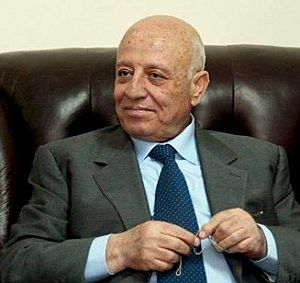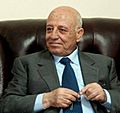Ahmed Qurei facts for kids
Quick facts for kids
Ahmed Qurei
|
|
|---|---|

Qurei in 2015
|
|
| Prime Minister of the Palestinian National Authority | |
| In office 24 December 2005 – 29 March 2006 |
|
| President | Mahmoud Abbas |
| Preceded by | Nabil Shaath (acting) |
| Succeeded by | Ismail Haniyeh |
| In office 7 October 2003 – 18 January 2005 |
|
| President |
|
| Preceded by | Mahmoud Abbas |
| Succeeded by | Nabil Shaath (acting) |
| Speaker of the Palestinian Legislative Council | |
| In office 7 March 1996 – 7 October 2003 |
|
| Preceded by | Position established |
| Succeeded by | Rafiq Al-Natsheh |
| Personal details | |
| Born | 26 March 1937 Abu Dis, Mandatory Palestine |
| Died | 22 February 2023 (aged 85) |
| Political party | Fatah |
Ahmed Ali Mohammed Qurei (also known as Abu Alaa) was an important Palestinian leader. He was born on March 26, 1937, near Jerusalem. He became the second Prime Minister of the Palestinian National Authority. He served in this role from 2003 to 2006.
Before becoming prime minister, he was the speaker of the Palestinian Legislative Council (PLC). He also held many important jobs within the Palestine Liberation Organization (PLO). Ahmed Qurei passed away on February 22, 2023, at the age of 85.
Early Political Career
Ahmed Qurei was born in Abu Dis, a town near Jerusalem. He joined the Fatah group in 1968. Fatah was the biggest group within the Palestine Liberation Organization (PLO).
Qurei was good with money. In the 1970s, he managed the PLO's investments and economic activities. He helped the organization become a major employer in Lebanon. When the PLO had to leave Lebanon, he followed its leader, Yasser Arafat, to Tunis. As other leaders grew older or passed away, Qurei became more important. He was chosen for the Fatah Central Committee in 1989.
As a member of the Central Committee, Qurei helped negotiate the Oslo Accords in 1993. These were important peace agreements. He also started the Palestinian Economic Council for Development and Reconstruction (PECDAR) in 1993. This group helped get money from other countries to develop Palestinian areas.
He held different jobs in the first Palestinian government. These included Minister of Economy & Trade and Minister of Industry. He also helped create a development plan for the Palestinian territories. In 1996, he was elected as the Speaker of the Palestinian Legislative Council. He was re-elected as speaker in 2001.
Prime Minister
In September 2003, the Palestinian Prime Minister, Mahmoud Abbas, resigned. Yasser Arafat, the Palestinian Authority President, then chose Ahmed Qurei for the job. Qurei agreed to lead an "emergency government" on September 10.
On October 5, 2003, Qurei was officially appointed prime minister. An eight-member emergency government was sworn in on October 7. Qurei faced challenges in forming a full government. He had disagreements with Arafat about who should be the interior minister.
Despite these issues, Qurei's new 24-member government was approved on November 12, 2003. One of his main goals was to work on the "Road map for Peace" plan with Israel. This plan aimed to bring peace to the region.
In July 2004, Qurei offered to resign because of growing problems in the Gaza Strip. There was some unrest, and some aid workers were briefly taken. President Arafat did not accept his resignation. They later reached an agreement, and Qurei stayed in his role.
After Arafat's death in November 2004, Mahmoud Abbas became president. Abbas asked Qurei to continue as prime minister and form a new government. After some changes to the list of ministers, his new government was approved in February 2005.
In December 2005, Qurei briefly resigned to run for a seat in the Palestinian Parliament. However, he decided not to run and returned to his prime minister job nine days later. In January 2006, he announced his plan to resign again. This was after his Fatah party lost the parliamentary elections to Hamas. President Abbas asked him to stay on as a caretaker until a new prime minister was chosen. Ismail Haniyeh took over from him.
Later Life and Death
In 2004, Qurei suggested that if Israel and the Palestinians could not agree on two separate states, they might need to consider one combined state. He believed that Israel's building of settlements made a two-state solution harder.
Ahmed Qurei passed away on February 22, 2023, at the age of 85.
Images for kids
See also
 In Spanish: Ahmed Qurei para niños
In Spanish: Ahmed Qurei para niños
 | Ernest Everett Just |
 | Mary Jackson |
 | Emmett Chappelle |
 | Marie Maynard Daly |


